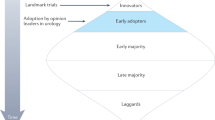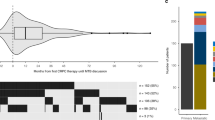Abstract
Background
The recommended treatment for a subset of patients with metastatic prostate cancer (mPC) changed from androgen deprivation therapy (ADT) to combinations with chemotherapy such as docetaxel. Implementation of new evidence from trials is however complex and challenging. We investigated the effect of multidisciplinary team meetings (MDTs) on adopting the newest emerging combination therapy in patients with mPC and assessed the overall survival of chemohormonal therapy in a real-world setting.
Methods
All mPC patients diagnosed between October 2015 and April 2016 in the Netherlands were identified from the population-based Netherlands Cancer Registry (n = 962). Logistic regression analyses were performed to examine the role of patient- and tumor characteristics, with special emphasis on MDTs, on receiving chemohormonal therapy versus ADT monotherapy. Kaplan-Meier survival curves were used to assess overall survival (OS).
Results
As many patients received ADT monotherapy as chemohormonal therapy (both n = 452). Being discussed in a MDT as patient, younger age, less comorbidities, a better performance status and high-volume disease were significantly associated with receiving chemohormonal therapy compared to ADT monotherapy. After adjustment for these factors, the presence of a MDT was independently associated with the administration of chemohormonal therapy (OR 2.77, 95% CI 1.68–4.59). The 2-year OS was 82.1% (95% CI: 78.5–85.6%) for patients receiving chemohormonal therapy and 59.9% (95% CI: 55.4–64.4%) for patients receiving ADT monotherapy.
Conclusion
Being discussed in a MDT is independently associated with the administration of chemohormonal therapy in this group of patients with mPC. This supports the hypothesis that implementation of innovative treatment options is facilitated by an organizational structure with MDTs.
This is a preview of subscription content, access via your institution
Access options
Subscribe to this journal
Receive 4 print issues and online access
$259.00 per year
only $64.75 per issue
Buy this article
- Purchase on Springer Link
- Instant access to full article PDF
Prices may be subject to local taxes which are calculated during checkout

Similar content being viewed by others
References
Weiner AB, Matulewicz RS, Eggener SE, Schaeffer EM. Increasing incidence of metastatic prostate cancer in the United States (2004-2013). Prostate Cancer Prostatic Dis. 2016;19:395–7.
Vernooij RWM, van Oort I, de Reijke TM, Aben KKH. Nationwide treatment patterns and survival of older patients with prostate cancer. J Geriatr Oncol. 2019;10:252–8.
Bray F, Ferlay J, Soerjomataram I, Siegel RL, Torre LA, Jemal A. Global cancer statistics 2018: GLOBOCAN estimates of incidence and mortality worldwide for 36 cancers in 185 countries. CA Cancer J Clin. 2018;68:394–424.
Loblaw DA, Virgo KS, Nam R, Somerfield MR, Ben-Josef E, Mendelson DS, et al. Initial hormonal management of androgen-sensitive metastatic, recurrent, or progressive prostate cancer: 2006 update of an American Society of Clinical Oncology practice guideline. J Clin Oncol. 2007;25:1596–605.
Cornford P, van den Bergh RCN, Briers E, den Broeck TV, Cumberbatch MG, De Santis M, et al. EAU-EANM-ESTRO-ESUR-SIOG guidelines on prostate cancer. Part II-2020 update: treatment of relapsing and metastatic prostate cancer. Eur Urol. 2020;79:263–82.
Gravis G, Fizazi K, Joly F, Oudard S, Priou F, Esterni B, et al. Androgen-deprivation therapy alone or with docetaxel in non-castrate metastatic prostate cancer (GETUG-AFU 15): a randomised, open-label, phase 3 trial. Lancet Oncol. 2013;14:149–58.
Vale CL, Burdett S, Rydzewska LHM, Albiges L, Clarke NW, Fisher D, et al. Addition of docetaxel or bisphosphonates to standard of care in men with localised or metastatic, hormone-sensitive prostate cancer: a systematic review and meta-analyses of aggregate data. Lancet Oncol. 2016;17:243–56.
James ND, Sydes MR, Clarke NW, Mason MD, Dearnaley DP, Spears MR, et al. Addition of docetaxel, zoledronic acid, or both to first-line long-term hormone therapy in prostate cancer (STAMPEDE): survival results from an adaptive, multiarm, multistage, platform randomised controlled trial. Lancet. 2016;387:1163–77.
Sweeney CJ, Chen YH, Carducci M, Liu G, Jarrard DF, Eisenberger M, et al. Chemohormonal therapy in metastatic hormone-sensitive prostate cancer. N Engl J Med. 2015;373:737–46.
Flottorp SA, Oxman AD, Krause J, Musila NR, Wensing M, Godycki-Cwirko M, et al. A checklist for identifying determinants of practice: a systematic review and synthesis of frameworks and taxonomies of factors that prevent or enable improvements in healthcare professional practice. Implement Sci. 2013;8:35.
Sheldon TA, Cullum N, Dawson D, Lankshear A, Lowson K, Watt I, et al. What’s the evidence that NICE guidance has been implemented? Results from a national evaluation using time series analysis, audit of patients’ notes, and interviews. BMJ. 2004;329:999.
Westgeest HM, Uyl-de Groot CA, van Moorselaar RJA, de Wit R, van den Bergh ACM, Coenen J, et al. Differences in trial and real-world populations in the Dutch castration-resistant prostate cancer registry. Eur Urol Focus. 2018;4:694–701.
Elting LS, Cooksley C, Bekele BN, Frumovitz M, Avritscher EB, Sun C, et al. Generalizability of cancer clinical trial results: prognostic differences between participants and nonparticipants. Cancer. 2006;106:2452–8.
Mottet N, Bellmunt J, Bolla M, Briers E, Cumberbatch MG, De Santis M, et al. EAU-ESTRO-SIOG guidelines on prostate cancer. Part 1: screening, diagnosis, and local treatment with curative intent. Eur Urol. 2017;71:618–29.
Pillay B, Wootten AC, Crowe H, Corcoran N, Tran B, Bowden P, et al. The impact of multidisciplinary team meetings on patient assessment, management and outcomes in oncology settings: a systematic review of the literature. Cancer Treat Rev. 2016;42:56–72.
Lamb BW, Taylor C, Lamb JN, Strickland SL, Vincent C, Green JS, et al. Facilitators and barriers to teamworking and patient centeredness in multidisciplinary cancer teams: findings of a national study. Ann Surg Oncol. 2013;20:1408–16.
Molokwu CN, Naqvi T, Tyson D. Multidisciplinary team management of patients with urological cancer. Br J Hosp Med. 2019;80:699–702.
Sobin LH, Compton CC. TNM seventh edition: what’s new, what’s changed: communication from the International Union Against Cancer and the American Joint Committee on Cancer. Cancer. 2010;116:5336–9.
Epstein JI, Allsbrook WC Jr., Amin MB, Egevad LL. Update on the Gleason grading system for prostate cancer: results of an international consensus conference of urologic pathologists. Adv Anat Pathol. 2006;13:57–9.
Charlson ME, Pompei P, Ales KL, MacKenzie CR. A new method of classifying prognostic comorbidity in longitudinal studies: development and validation. J Chronic Dis. 1987;40:373–83.
Rankin NM, Lai M, Miller D, Beale P, Spigelman A, Prest G, et al. Cancer multidisciplinary team meetings in practice: Results from a multi-institutional quantitative survey and implications for policy change. Asia Pac J Clin Oncol. 2018;14:74–83.
Berardi R, Morgese F, Rinaldi S, Torniai M, Mentrasti G, Scortichini L, et al. Benefits and Limitations of a Multidisciplinary Approach in Cancer Patient Management. Cancer Manag Res. 2020;12:9363–74.
Field B, Booth A, Ilott I, Gerrish K. Using the Knowledge to Action Framework in practice: a citation analysis and systematic review. Implement Sci. 2014;9:172.
Norberg H, Bergdahl E, Angerud KH, Lindmark K. A systematic approach for introduction of novel treatments to a chronic patient group: sacubitril-valsartan as a case study. Eur J Clin Pharmacol. 2021;77:125–31.
Rulach RJ, McKay S, Neilson S, White L, Wallace J, Carruthers R, et al. Real-world uptake, safety profile and outcomes of docetaxel in newly diagnosed metastatic prostate cancer. BJU Int. 2018;121:268–74.
Tsao CK, Oh WK. First-Line treatment of hormone-sensitive metastatic prostate cancer: is there a single standard of care? J Clin Oncol. 2018;36:1060–1.
Fizazi K, Tran N, Fein L, Matsubara N, Rodriguez-Antolin A, Alekseev BY, et al. Abiraterone acetate plus prednisone in patients with newly diagnosed high-risk metastatic castration-sensitive prostate cancer (LATITUDE): final overall survival analysis of a randomised, double-blind, phase 3 trial. Lancet Oncol. 2019;20:686–700.
Wallis CJD, Klaassen Z, Bhindi B, Goldberg H, Chandrasekar T, Farrell AM, et al. Comparison of abiraterone acetate and docetaxel with androgen deprivation therapy in high-risk and metastatic hormone-naive prostate cancer: a systematic review and network meta-analysis. Eur Urol. 2018;73:834–44.
Marchioni M, Di Nicola M, Primiceri G, Novara G, Castellan P, Paul AK, et al. New antiandrogen compounds compared to docetaxel for metastatic hormone sensitive prostate cancer: results from a network meta-analysis. J Urol. 2020;203:751–9.
Sydes MR, Spears MR, Mason MD, Clarke NW, Dearnaley DP, de Bono JS, et al. Adding abiraterone or docetaxel to long-term hormone therapy for prostate cancer: directly randomised data from the STAMPEDE multi-arm, multi-stage platform protocol. Ann Oncol. 2018;29:1235–48.
Chi KN, Protheroe A, Rodriguez-Antolin A, Facchini G, Suttman H, Matsubara N, et al. Patient-reported outcomes following abiraterone acetate plus prednisone added to androgen deprivation therapy in patients with newly diagnosed metastatic castration-naive prostate cancer (LATITUDE): an international, randomised phase 3 trial. Lancet Oncol. 2018;19:194–206.
McNamara M, Sweeney C, Antonarakis ES, Armstrong AJ. The evolving landscape of metastatic hormone-sensitive prostate cancer: a critical review of the evidence for adding docetaxel or abiraterone to androgen deprivation. Prostate Cancer Prostatic Dis. 2018;21:306–18.
Lowrance WT, Breau RH, Chou R, Chapin BF, Crispino T, Dreicer R, et al. Advanced prostate cancer: AUA/ASTRO/SUO guideline PART I. J Urol. 2020:101097JU0000000000001375.
Lowrance WT, Breau RH, Chou R, Chapin BF, Crispino T, Dreicer R, et al. Advanced prostate cancer: AUA/ASTRO/SUO guideline PART II. J Urol. 2020:101097JU0000000000001376.
Funding
The study was financially supported by the Dutch Cancer Society (project number 2013-5942), principal investigators LAK, IO, KKHA.
Author information
Authors and Affiliations
Consortia
Contributions
SG wrote the paper and has made contributions to conception and design. BS has contributed to data acquisition and performed the analyses. PH, FWPJB and KKHA have contributed to conception and design, interpretation of data and revised the manuscript. LAK and IMO have revised the manuscript critically for important intellectual content.
Corresponding author
Ethics declarations
Competing interests
PH: consulting fees for Astellas, MSD, Pfizer, AstraZeneca, BMS, Ipsen
Additional information
Publisher’s note Springer Nature remains neutral with regard to jurisdictional claims in published maps and institutional affiliations.
Rights and permissions
About this article
Cite this article
Creemers, S.G., Van Santvoort, B., van den Berkmortel, F.W.P.J. et al. Role of multidisciplinary team meetings in implementation of chemohormonal therapy in metastatic prostate cancer in daily practice. Prostate Cancer Prostatic Dis 26, 133–141 (2023). https://doi.org/10.1038/s41391-022-00556-z
Received:
Revised:
Accepted:
Published:
Issue Date:
DOI: https://doi.org/10.1038/s41391-022-00556-z
This article is cited by
-
Application of surgical video combined with a multidisciplinary treatment integrated teaching method in the clinical teaching of thyroid surgery
Education and Information Technologies (2023)
-
Addressing Challenges and Controversies in the Management of Prostate Cancer with Multidisciplinary Teams
Targeted Oncology (2022)



